People almost never ask why.
In business, we have endless data about the what, when, where, and how much. It’s comforting because it’s definitive. “Last month’s sales in Colorado were X and they were up by Y.” Got it. Scoreboards are simple. Concrete. We might even try to draw conclusions: “Oh, that must be because of the awesome ad campaign we ran.”
The same thing happens in our culture. “100 Million people voted for that guy? They must be bigots.” Or, “100 Million people voted for that guy? They must be Marxists.”
Why is hard, damn near impossible sometimes. So, we mail it in, latching on to some lazy, preconceived sense of causality. As long as the numbers bear out my theories or biases, I revel. If they don’t, I’ll just wait for the next batch. All statistics are transitory, eventually.
Things like the resiliency of consumer spending and the job market continue to defy logic, like the recession that’s been a month away for nearly two years. The beyond-consensus monthly numbers come out, we ooh and aah for a few hours until the news cycle serves up new raw meat for us to chew, and we move on.
Why takes time. Thoughtfulness takes time.
That’s because, behind nearly every why are people (who) – living, breathing, hoping, fearing, genetically unique and infinitely complicated people.
To make matters even more difficult, those people often don’t understand why they do things. We watch it happen in survey research all the time.
Ask me why I shop for groceries at the Giant Eagle every week. I might say it’s because it’s conveniently close to my house. But the Aldi is actually closer. Maybe it’s the wide selection. But the Walmart’s nearby too. Maybe, it’s because we’re snobs. But then why don’t I drive a few minutes further to the Whole Foods? It’s probably just because I’m from Pittsburgh and I’ve shopped at Giant Eagle my entire life. I guess.
And why does why matter so much? Because it’s the only reliable way to figure out the what’s next – and, in business, that’s what separates the heroes from the goats, luck notwithstanding.
We hear so many companies talk about being more “customer-centric.” And it’s just that – a lot of talk. Studying what your customers did yesterday is like betting on a football game based on how your team played last week. The why explains what they’ll do tomorrow.
Behaviors don’t define people. The why does.
Here’s what we’re seeing:
Consumer confidence is holding steady. It’s actually up just a hair, but not enough to party over – although we can celebrate the appreciable YoY improvement. Overall, our Economic Sentiment Index was a mixed bag this week. Confidence in the job market rebounded significantly after sliding in the last reading, while confidence in personal finances and the 6-month outlook for the U.S. economy lagged (but again only slightly). Considering the steady slowing of inflation and consumers’ willingness to keep spending, it all feels pretty good.
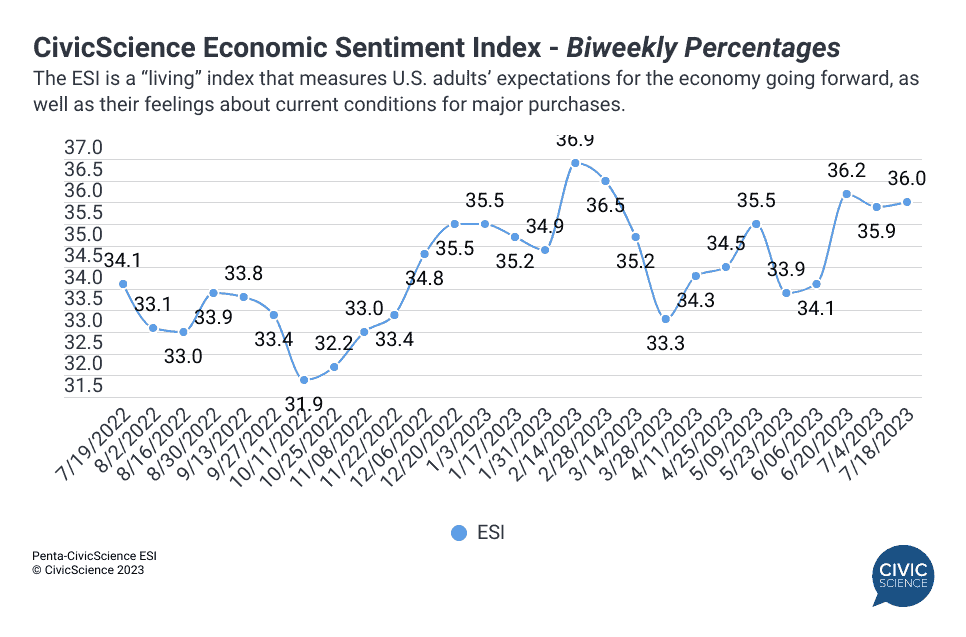
Hefty electric bills are going to hit our wallets hard this month. The nationwide heat wave, not to mention the wildfire smoke that visits the upper half of the country every few weeks, has Americans changing their summer behaviors in a number of different ways. In our 3 Things to Know this week, we looked at how people are beating the heat, including the 53% of Americans who say they’re running their AC more than usual ($$$) and the 31% who are spending more time chilling in the pool, lake, etc. We also examined public sentiment around the role of the federal government in combating misinformation on social media. In other news, the “great resignation” seems to be officially over – as millions of people improved their job situation over the past couple years.
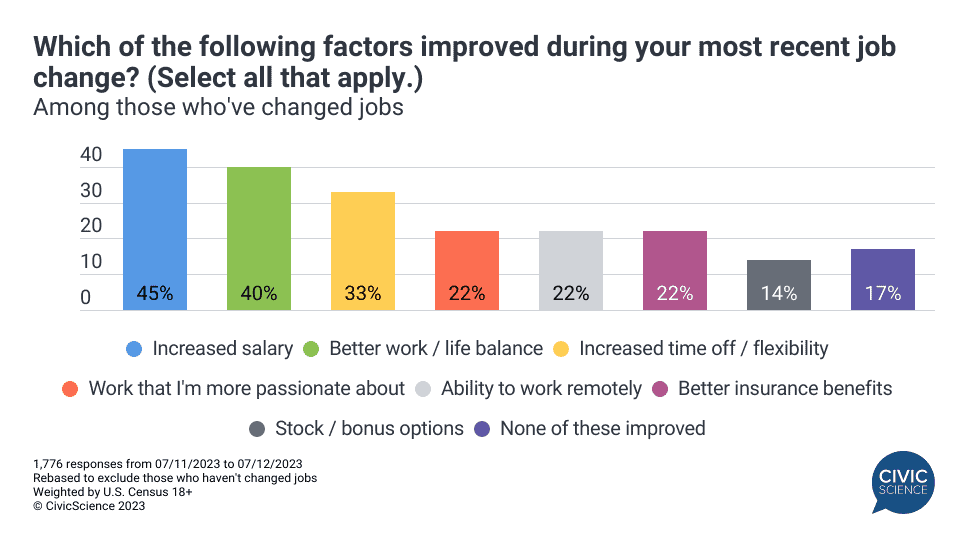
A hypothetical (hopefully) UPS strike could shake up retail. As the Teamsters and UPS play a high-stakes game of chicken ahead of an August 1 contract deadline, analysts estimate that a prolonged work stoppage could ding the economy for over $7 Billion – which would make it the costliest strike in U.S. history. E-commerce stands to be disrupted massively – with winners and losers – as 69% of online shoppers say they will seek out retailers who DON’T use UPS if a strike materializes. It’s especially likely among higher earners. Twenty-seven percent of adults say they’ll be less likely to shop online at all if it happens, which presumes they’ll skew toward brick-and-mortar. Stay tuned.
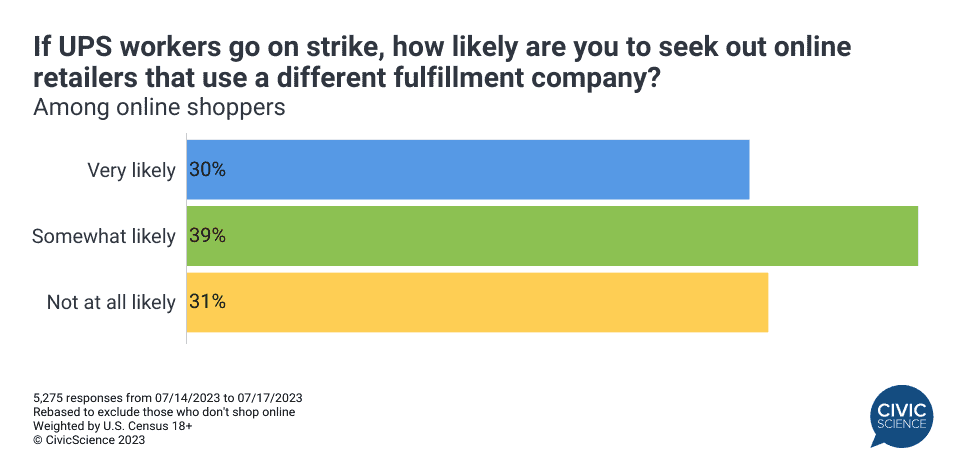
Security concerns are dampening enthusiasm for mobile payment apps. In our latest data about mobile payment services, like PayPal and Apple Pay, we found a mix of good and bad news for the industry (and for traditional banks and credit card companies, inversely). Upwards of 44% of U.S. adults today use at least one mobile payment app and 35% use them for in-store purchases. That’s good. Still, however, only 5% use them as their primary form of payment. The biggest barrier to growth? Security and privacy fears. Forty-one percent of infrequent app users say it’s the main reason they don’t use them more.
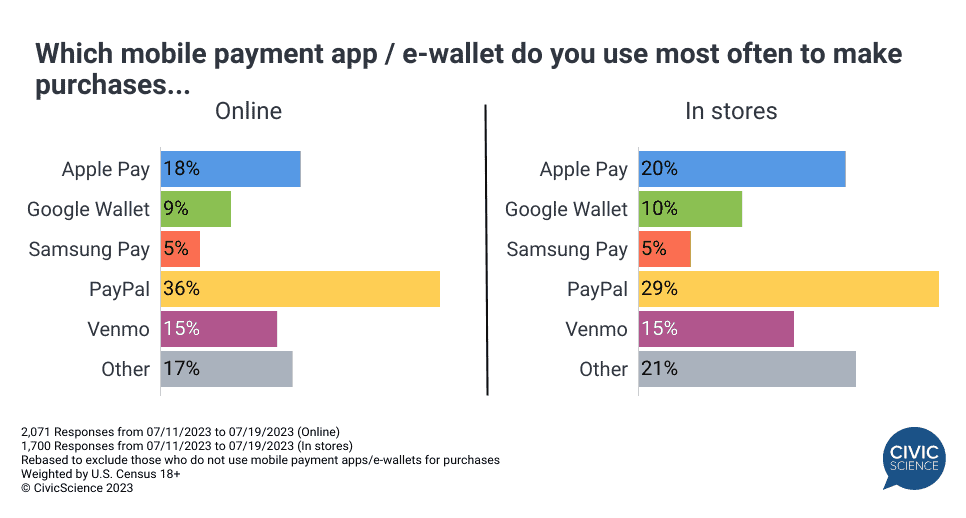
Gen Z doesn’t really think about alcohol that much differently than the rest of us. Of all the ways our youngest generation of adults are enlightened – from their views on inclusivity to the climate to mental health – they’re pretty much drunks like everyone else. In fact, 62% of 21 to 24-year-olds say they booze at least monthly, the highest percentage among any group we measure. Twenty-two percent of them have at least 10 drinks per week, also the highest. Puzzlingly, they’re also the age group most concerned about the health effects of alcohol – it just doesn’t seem to be slowing them down. Also…see Gen X. Classic.
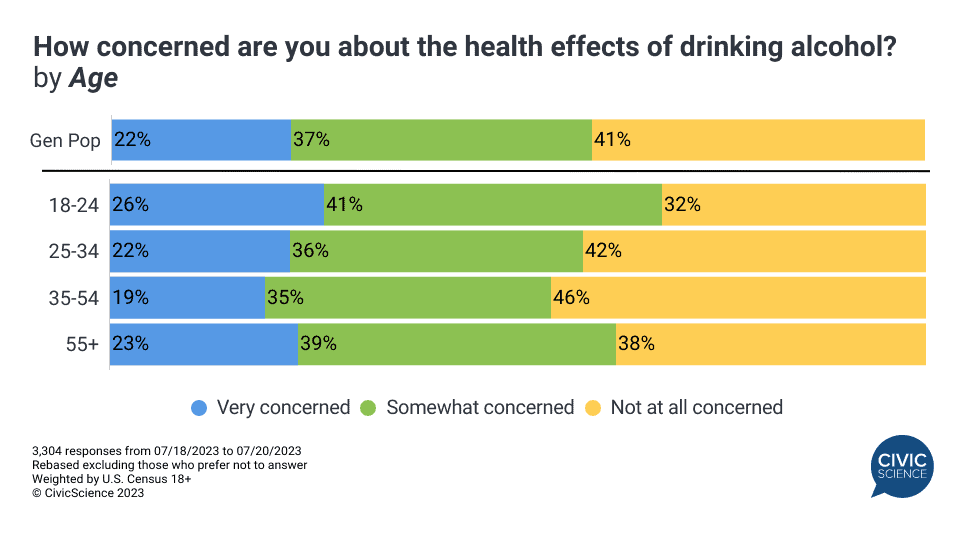
More awesomeness from the InsightStore™ this week:
- Gen Z will have no problem watching reruns while most of Hollywood is on strike;
- Oppenheimer should draw huge audiences, but Barbie moviegoers will be a marketer’s dream;
- Verizon mobile customers are the least likely to consider switching service right now and 4 other predictive insights about carrier switchers;
- Hoka continues to be a brand on the run – especially among commuters.
The most popular questions this week:
- Have you ever regretted a big purchase you made shortly after making it?
- Which type of potato salad do you prefer – mayonnaise-based or vinegar-based?
- Do you prefer manual or automatic transmission in your car?
- Have you personally tried any methods to extend your life or slow the effects of aging?
- How good of a singer do you think you are?
Answer Key: Yes, chinchillas; Mayo; Automatic for day-to-day, but manual is more fun; Nope; Pretty good.
Hoping you’re well.
JD
Not on the list to receive this weekly email? Sign up here. If you are new to this list, check out our Top Ten to get caught up.








